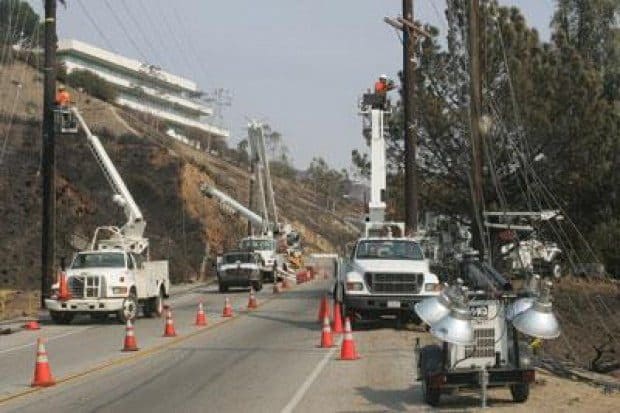Southern California Edison faces claims by a state agency that it destroyed evidence from the 2007 Malibu Canyon wildfire, then misled investigators about it.
By Knowles Adkisson / The Malibu Times
The legal fallout from the 2007 Malibu Canyon wildfire continued earlier this month, when an administrative law judge rejected Southern California Edison’s motion to dismiss a state agency’s claims that Edison destroyed evidence related to the fire and misled investigators about it.
The state is charging two types of violations, safety violations and violations of Rule 1.1, which require utilities to be honest in their dealings with the state. The judge’s ruling relates to Rule 1.1: Edison is accused of destroying evidence it would keep for the state, and misleading investigators about it.
The Oct. 21, 2007 fire began when three power poles owned by Edison snapped in high winds, causing live electrical wires to ignite nearby brush. The blaze swept down Malibu Canyon, destroying 14 structures and 36 vehicles and causing central Malibu to be evacuated for three days.
Edison and four cell phone companies-Sprint Telephony PCS, Verizon Wireless, NextG Networks of California and AT&T Mobility-have been accused of safety violations for overloading at least one of the failed power poles with heavy telecommunications equipment. In addition, Edison is accused of destroying evidence and misleading state investigators about it, and an Edison employee is accused of lying under oath about the cause of the fire.
The accusations were made last year by the state Public Utilities Commission’s (PUC) Consumer Protection and Safety Division (CPSD). The PUC regulates privately owned utilities and telecommunications companies in California. The (CPSD) is its investigative arm.
The CPSD in October recommended that the PUC fine the companies $99.2 million in total for overloading the poles, with the recommended fine for Edison more than $49 million. Evidentiary hearings in front of the PUC are scheduled to begin March 5 and expect to last five weeks, according to court documents filed Jan. 18.
The recent ruling, issued by Administrative Law Judge Timothy Kenney on Jan. 10 in San Francisco, concerns allegations by the CPSD that Edison got rid of evidence from the site and then intentionally concealed that information from investigators.
After the fire, Edison cleaned up the site where the power poles fell and shipped most of the material to a company facility in Westminster. However, several feet of damaged conductor and several thousand feet of damaged telecommunications cable were disposed of. Parts of a KPF switch, a device used to disconnect power for maintenance, were also reused at other locations, according to court documents.
The CPSD in Nov. 2010 requested that Edison provide the location of all evidence “under your or your agent’s physical control, custody or possession related to the incident.” Edison’s response stated that “all of the ‘physical evidence’ associated with the failed poles was removed from Malibu Canyon and retained is located in a SCE facility in Westminster, California.”
However, three of the cell phone companies that were asked the same questions about the evidence “admitted that some evidence had been removed from the incident site and destroyed,” according to the CPSD.
Edison then requested summary adjudication from Judge Kenney to exclude the allegations from ongoing legal process.
Kenney denied the request on Jan. 10, ruling there were “triable issues of material fact” about whether Edison’s responses were misleading and violated Rule 1.1. Kenney also appeared to chide Edison for its contention that it could not have misled the CPSD because the state agency knew beforehand which evidence had been kept and which had been discarded.
“The relevant inquiry is whether SCE attempted to mislead CPSD thorough [sic] an artifice or false statement,” Kenney wrote. “SCE’s success at misleading CPSD is not germane to this inquiry.”
It is not unusual for judges to deny summary adjudication if the judge finds there are factual disputes that should be heard. Edison representative Lauren Bartlett downplayed the ruling Friday in an email to The Malibu Times.
“The recent rulings by the administrative law judge handling the investigation into the 2007 Malibu wildfire means it is premature to dismiss the claims,” Bartlett wrote. “If there are disputes about facts in a case, motions for summary adjudication typically are not granted. In this case, the administrative law judge did not make any factual findings. He said that questions about facts remain and will be resolved at the hearings.”

